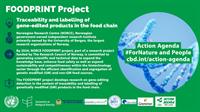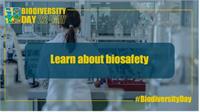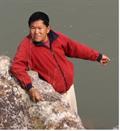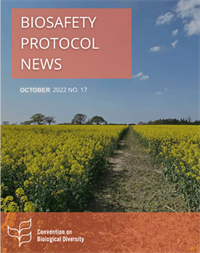 |
Latest Issue: No. 17 – 2022 |
The Biosafety Clearing-House (BCH) is at the core of the Cartagena Protocol on Biosafety. The Protocol provides that Parties can take their own decisions on living modified organisms (LMOs). At the same time, decisions associated with risk assessments are shared with the world so that other countries can make informed decisions. Therefore, the BCH is an important information exchange mechanism that enables governments to implement the Protocol. It is a key repository of up-to-date information on LMOs that can assist stakeholders and decision-makers in government, the biotechnology industry, and civil society.
In 2005, the BCH Regional Advisors Network (RAN) was developed by the first BCH project to enhance expertise about the Protocol and the BCH at the regional level. The BCH Regional Advisors provide assistance and training services to countries and prompt responses to their practical concerns about daily issues on their national BCH.
|
-Ms. Elizabeth Maruma Mrema, Executive Secretary, Convention on Biological Diversity, United Nations Environment Programme (UNEP) |
 |
The BCH Regional Advisors have provided guidance and training to government officials, academia, and other BCH users all across the globe. In this newsletter, BCH Regional Advisors share their roles and responsibilities.
With the recent launch of the new platform of the BCH in November 2021, our users are in need of the support provided by this group more than ever. The BCH can only achieve the goal of being a central hub of comprehensive information on biosafety if our Parties and stakeholders are familiar and comfortable navigating its new platform and continue submitting accurate and up-to-date information. In this regard, the BCH Regional Advisors (RAs) must continue facilitating regional and national knowledge-sharing measures, such as platforms and seminars to assist Parties as they make all the information available on the BCH. I acknowledged and appreciated all contributors who made quotes in this newsletter. |
|
-Ms. María de Lourdes Torres, BCH Regional Advisor for Latin America |
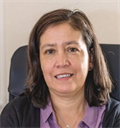 |
Being a BCH regional advisor has allowed me to learn about the different ways Latin American countries understand and implement the Cartagena Protocol. It has been an enriching experience, where the main message is the importance of making information available for the proper management of LMOs with the perspective of conservation and sustainable use of our biodivesity.
Ser asesora regional del BCH para los países de América Latina me ha permitido conocer las diferentes formas en que estos países entienden y aplican el Protocolo de Cartagena sobre Seguridad de la Biotecnología, en particular promoviendo el intercambio de información a través del Centro de Intercambio de Información sobre Seguridad de la Biotecnología. Personalmente, a través de la información disponible en el BCH, he aprendido sobre las diferentes formas en que los países llevan a cabo las evaluaciones de riesgo. Durante los diferentes talleres que he impartido en países de Centro y Sudamérica como Guatemala, Honduras, Paraguay, Uruguay, entre otros, me he dado cuenta del interés de las personas por conocer el BCH. A partir de esta enriquecedora experiencia, la principal recomendación sería la importancia de que la información esté disponible para el manejo adecuado de los organismos vivos modificados (OVMs) para la conservación y uso sostenible de nuestra biodiversidad. |
|
-Mr. Aleksej Tarasjev, Head of Department for Evolutionary Biology |
| After a pause caused by the pandemic, I participated in BCH III project workshops in the Central and Eastern European (CEE) region in Albania, Bosnia and Herzegovina, Armenia, and Kyrgyzstan in online, hybrid and in person formats. The need for additional training on new BCH Central Portal (CP) and the advantages of two RAs working in person on each mission were apparent. This is especially true for group work, which is an essential part of any BCH training of multiple stakeholders and contributors in effective use of new BCH platform after information migration. |
|
– Ms. Chantal Andrianarivo, BCH Regional Advisor for Sub-Saharan Africa |
 |
Over the years, African countries benefited from the Biosafety Clearing-House projects (BCH Project I, II and III) received support from BCH Regional Advisors. My role as a BCH regional advisor for Africa has mainly been to support training workshops for national actors working on implementing the Cartagena Protocol on Biosafety itself as well as support to search and register information on the Central Portal of the BCH.
For the future this efficient training-communication method is recommended to be applied to the other CBD protocols; indeed, it stimulates countries to make greater use of available tools such as the training site in the BCH and fulfill the obligations for the BCH under the Cartagena Protocol. Au fil des ans, les pays africains qui ont bénéficié des projets du Centre d’échange pour la prévention des risques biotechnologiques (projets I, II et III du CEPRB) ont reçu le soutien des conseillers régionaux du CEPRB. Mon rôle en tant que conseiller régional du CEPRB pour l’Afrique a principalement consisté à encadrer des ateliers de formation destinés aux acteurs nationaux travaillant à la mise en œuvre du Protocole de Cartagena sur la prévention des risques biotechnologiques, ainsi qu’à les aider à la recherche et à l’enregistrement des informations sur le portail central du CEPRB. Pour l’avenir, il est recommandé d’appliquer cette méthode efficace de formation-communication aux autres protocoles de la CDB ; en effet, elle incite les pays à utiliser davantage les outils disponibles tels que le site de formation du CEPRB et à remplir les obligations du CEPRB dans le cadre du Protocole de Cartagena. |
|
-Dr. Ruel V. Maningas, Regional Advisor for Asia, UNEP-GEF-BCH Project |
| For the past 16 years, as a regional BCH advisor (RA), my role was to provide technical assistance to build capacity to more than 15 Asian countries through working with the BCH national focal points. The lesson learnt is that the nature and level of technical assistance needs vary from country to country. The journey as an RA becomes more inspiring when countries conduct projects in the pursuit for biosafety in Asia. |

Issue 3 of the Action Agenda Newsletter, with biosafety commitments from non-state actors
Webinar – Science background for the post-2020 global biodiversity framework, 18 October 2022
High-Level Segment for Part Two of the United Nations Biodiversity Conference
|
Statistics and Other Information |
|
Taking stock: 6 months since migrating to the new platform |
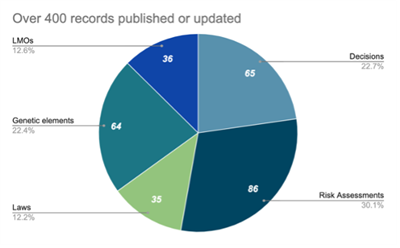

The new Biosafety Clearing-House (BCH) platform was launched on 28 November 2021. After migrating to the new platform, over 400 records was published or updated and five metrics (users, page views, bounce rate, pages per session, and average session duration) have proved a success on the platform migration. For example, the number of users has nearly doubled, and the average session duration almost quadrupled within six months after launch compared to the months prior to the launch.

Launch of the new Biosafety-Clearing-House platform
International Day for Biological Diversity (IDB) Celebration
22 actions for the Action Agenda for non-state actors to make biosafety commitments
 |
Orestes Plasencia (1965 – 2022)
With immense sadness, we announce the death of our colleague, Orestes Plasencia, who held the position of Editor at the Secretariat of the Convention on Biological Diversity since 2014. Orestes’ passing is a devastating loss for the SCBD and he will be sorely missed by everyone who had the pleasure of working with him. More information is available at IN MEMORIAM: ORESTES PLASENCIA (1965 – 2022) |
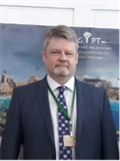 |
Johan Hedlund (1962 – 2022)
With immense sadness, we announce the untimely death of our colleague, Johan Hedlund, who held the position of Associate Information Officer at the Secretariat of the Convention on Biological Diversity since 2006. Johan’s passing is a devastating loss for the CBD Secretariat, our sadness is lessened only slightly with the comforting thought that we had the privilege to know him. More information is available at IN MEMORIAM: JOHAN HEDLUND (1962 – 2022) |
Protocol’s anniversary 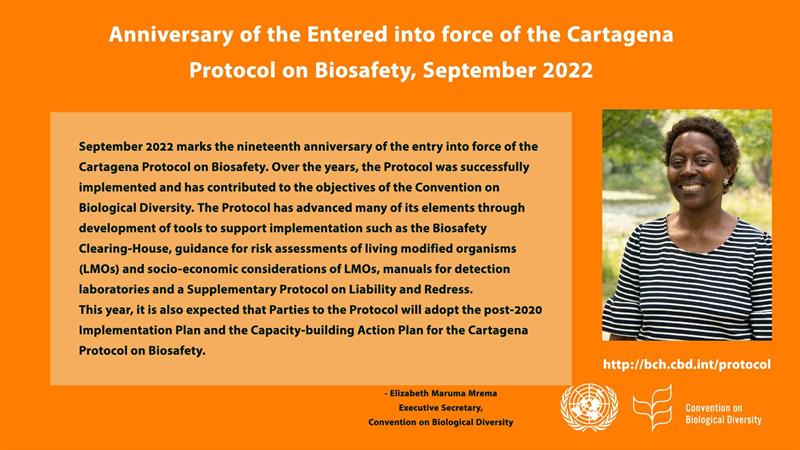
Supplementary Protocol’s anniversary 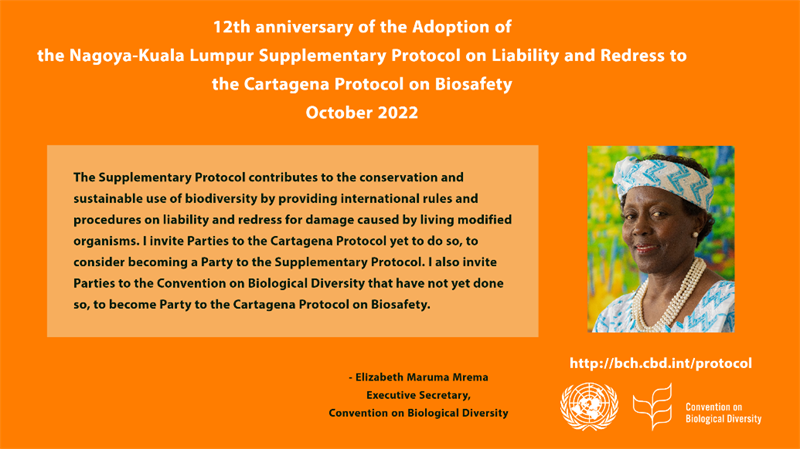
|
Recent and Upcoming Biosafety Events |
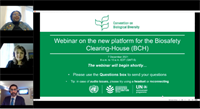
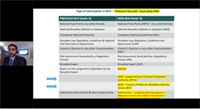
The Secretariat hosted a webinar on 7 December 2021 to introduce the new Biosafety Clearing House (BCH) platform, demonstrate its primary features, and provide an opportunity for users to ask questions. The new platform provides a more user-friendly experience and streamlines the process for publishing records and searching for information on the Biosafety Clearing-House.
The Video recording of the webinar is available on YouTube with the link.
|
The Fourth Open-ended Working Group 4 and the Information Session on the Action Agenda for Nature and People |
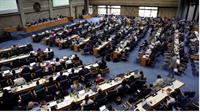
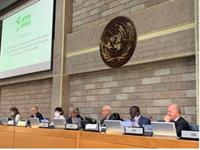
During the Fourth Open-ended Working Group (OEWG 4), held from 21 to 26 June 2022, Parties to the Convention on Biodiversity and the Cartagena Protocol on Biosafety advanced the text of the post-2020 global biodiversity framework for the United Nations Biodiversity Conference that is being held in Montreal, Canada, from 5 to 17 December 2022. Delegates achieved consensus on several targets, including Target 17 related to biotechnology. The discussions also strengthened the role of indigenous peoples and local communities, women, youth, and other non-state actors. More information is available in the press release and online.
During the OEWG 4, an information session on the Action Agenda for Nature and People was held and organized by CO14 and COP 15 Presidencies of the Convention on Biological Diversity (CBD), the Friends of Action group for the Action Agenda for Nature and the Secretariat of the Convention on Biological Diversity co-highlighting the role of the Action Agenda for non-state actors. The event showcased the momentum building across a whole-of-society, engaging non-state actors and shaping elements of the Action Agenda, in the lead up to COP 15 and beyond. The event underscored fundamental links between non-state actors and the real economy at local, sub-national, national, and global levels. A panel of experts and non-state actor representatives, including the Co-Chairs of the OEWG, spoke to how their sectors were moving from biodiversity commitments to implementation. More information can be found at here. Video recording: Information session on the Action Agenda (25 June 2022 – Nairobi, Kenya)
|
Webinar on the Launch of CBD Technical Series No. 100: Synthetic Biology |
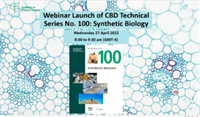
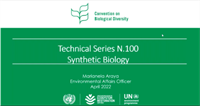
COP decision 14/19 requested the Executive Secretary to update the Technical Series on Synthetic Biology and to further pursue cooperation with other organizations, conventions and initiatives on issues related to synthetic biology, including the exchange of experiences and information. In response to COP decision 14/19, the Secretariat of the Convention on Biological Diversity organized a global webinar to launch the CBD Technical Series No. 100 on Synthetic Biology. The following speakers participated: the World Health Organization, the Convention on International Trade in Endangered Species of Wild Fauna and Flora, the Biological Weapons Convention, the International Union for Conservation of Nature, the United Nations Conference on Trade and Development, and the SCBD. The webinar took place virtually on 27 April 2022.
The video recording of the webinar is available on YouTube. The technical series is available here
|
Webinar on the Launch of Biosafety Technical Series 05: Training Manual on Detection and Identification of LMOs |
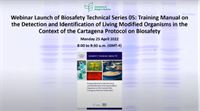
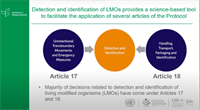
In Decision CP-9/11, the Executive Secretary was requested to review and finalize the manual on detection and identification of living modified organisms (LMOs), ensuring consistency and language in scope with Article 17 of the Cartagena Protocol on Biosafety. In response to this decision, the Secretariat announced the publication of the Training Manual on the Detection and Identification of LMOs as Biosafety Technical Series 05. The publication was launched at a global webinar held on 25 April 2022. The video recording of the webinar is available on YouTube. The technical series is available here
|
BCH Training-of-trainers Workshop for Regional Advisors |
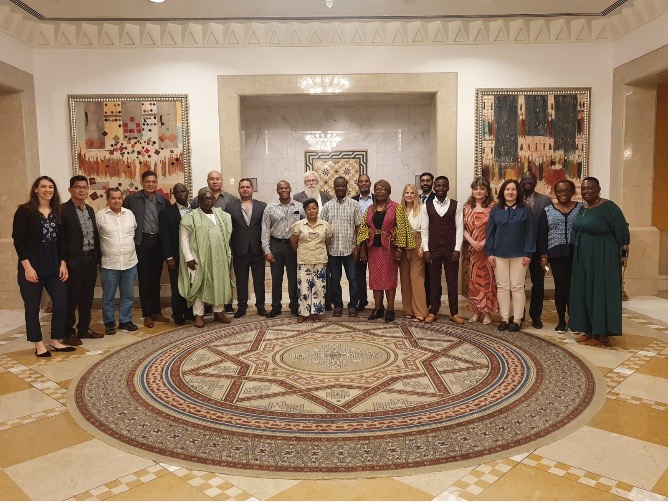
A Global BCH Training of Trainers Workshop for the Regional Advisors Network took place from 13 to 17 June 2022, in Dubai, the United Arab Emirates. A total number of 22 participants attended the meeting, including 14 BCH regional advisors, 6 UNEP BCH III Project staff members and 2 staff members from the SCBD. The workshop was organized by members of the Regional Advisor Network with the financial support of the UNEP BCH III Project, in collaboration with the SCBD. The workshop was divided into 7 core themes, including sessions on Genetic technologies, the Cartagena Protocol, Feedback from National Workshops, Multilateral Environmental Agreements, and the Way Forward for the RA Network. The workshop provided an opportunity to familiarize the regional advisors with the new platform, identify key training materials that needed to be updated, and discuss best practices for hosting remote and hybrid workshops on the BCH.
|
Francophone Africa and Western, Central and Eastern Asian Training Course on Risk Assessment of Living Modified Organisms |

Two training courses on risk assessment of LMOs took place in September and October with financial support from the Government of the Republic of Korea, through the Korea Biosafety Capacity-Building Initiative. The objectives of the workshops were to provide theoretical and practical training on risk assessment of LMOs through the evaluation of case studies of LMOs for environmental release applying the risk assessment methodology to develop risk scenarios to assess. The workshop for the Francophone African region, took place in Dakar, Senegal from 19 to 22 September 2022, and it was hosted in collaboration with the Department of Environmental Affairs of Senegal and the African Biosafety Network of Expertise (ABNE). The workshop for Wester, Central and Eastern Asian region took place in Antalya, Türkiye, from 17-21 October 2022, and it was hosted in collaboration with the Ministry of Agriculture and Forestry General Directorate of Agricultural Research and Policies of Türkiye.
|
ISAAA Virtual Asia pre-COP-MOP debriefing meeting |


The International Service for the Acquisition of Agri-biotech Applications ISAAA organized a general recap of the Convention and its Protocols and a debriefing of the discussions in the last COP-MOPs for the Asian region from 5 – 6 October 2022, in which the SCBD held a presentation, on 5 October 2022. The SCBD’s presentation focused on the preparations for COP-MOP 10, including provisional agenda, key expectations, related items under COP 15, post-2020 biosafety items, current status of the Implementation Plan and Capacity Building Action Plan and the biosafety component of the post-2020 Global Biodiversity Framework on Target 17.
Conference of the Parties serving as the meeting of the Parties to the Cartagena Protocol on Biosafety COP-MOP 10, including a CEPA Fair for biosafety’s commitments form non-state actors, 5-17 December 2022, in Montreal, Canada 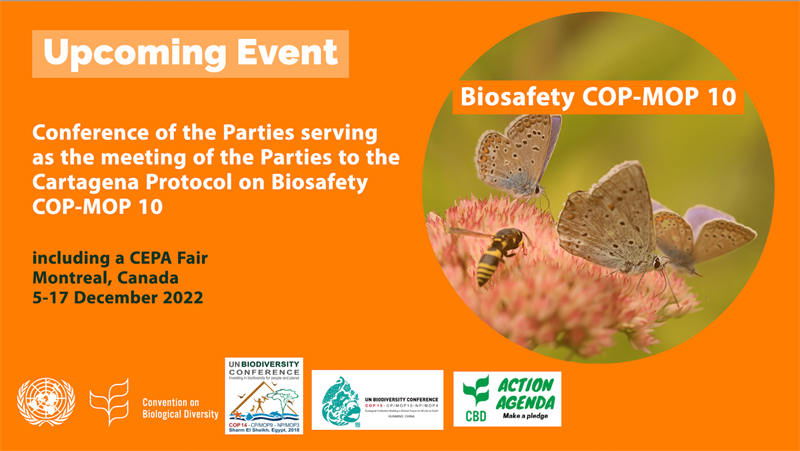
The second part of the tenth Conference of the Parties serving as the meeting of the Parties to the Cartagena Protocol on Biosafety (COP-MOP 10), 7 to 19 December 2022, in Montreal, Canada. COP-MOP 10 is expected to make a decision on the Implementation Plan for the Cartagena Protocol, the draft action plan for capacity-building and Target 17 of the post-2020 global biodiversity framework, related to biotechnology. Over the years, Parties to the Cartagena Protocol, partly through the Liaison Group, have discussed the text of the plans and Target 17. These are critical tools in advancing the biosafety agenda over the coming years. COP-MOP 10 will reinforce the work together to galvanize action at the national level for biosafety to contribute further to protecting biodiversity.
|
CEPA Fair Biosafety Event |
A Fair on Communication, Education and Public Awareness (CEPA) Fair biosafety event will be held 9 December 1:15 p.m. – 2:45 p.m. (Tentative). The event aims to, among others, for sharing information on the importance of the CEPA elements for the risk analysis process in support of the implementation of the CPB.
|
Action Zone Biosafety Event |
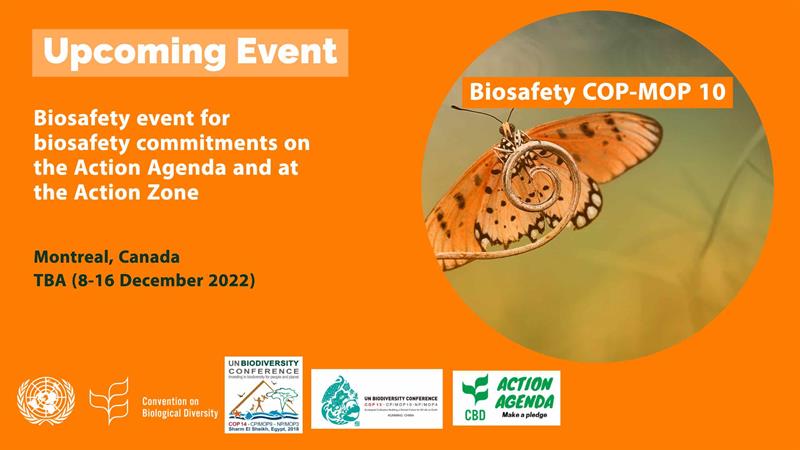
The biosafety event for biosafety commitments on the Action Agenda for Nature and People at the Action Zone will take place one day during COP-MOP 10, in Montreal, Canada. More information will be available shortly.
|
Biosafety Clearing-House Workshop |
BCH Clearing-House Training Workshop, 5 to 6 December 2022, in Montreal, Canada. More information will be available at link
Editors:
Ulrika Nilsson
Wadzanayi Mandivenyi
Zakir Jafry
Yuchen Gui
Photo credit:
María de Lourdes Torres
Aleksej Tarasjev
Chantal Andrianarivo
Ruel V. Maningas
Archive: Previous newsletter issues
Subscription: Newsletter subscription
Disclaimer: The designations employed and the presentation of the material in this publication do not imply the expression of any opinion whatsoever on the part of the Secretariat of the Convention on Biological Diversity concerning the legal status of any country, territory, city or area or of its authorities, or concerning the delimitation of its frontiers or boundaries. The views expressed in this publication are those of the authors and do not necessarily reflect those of the two secretariats, nor does citing of trade names or commercial processes constitute endorsement.



